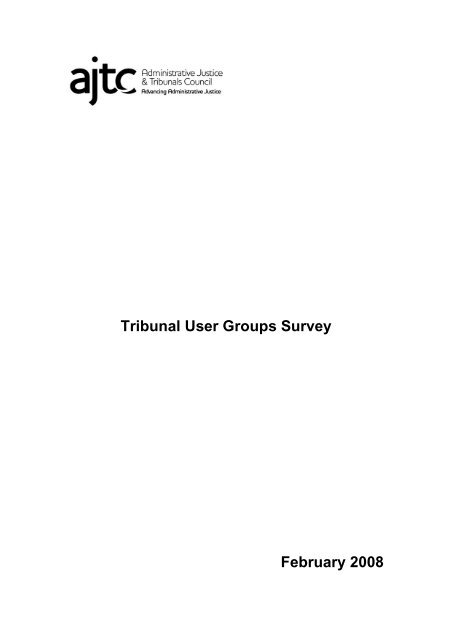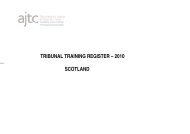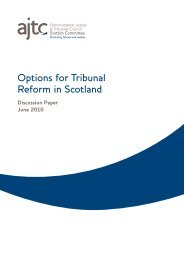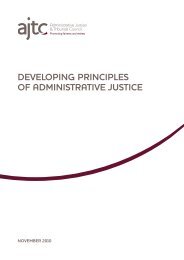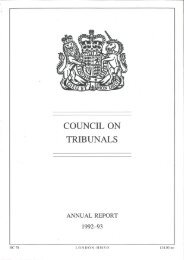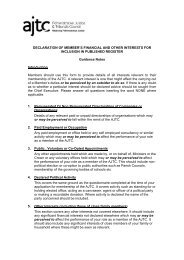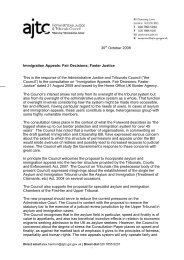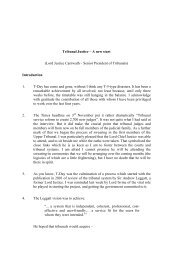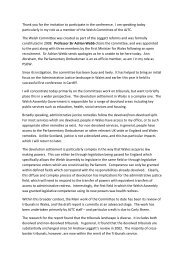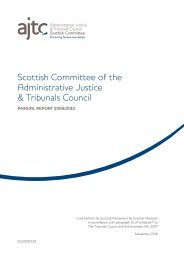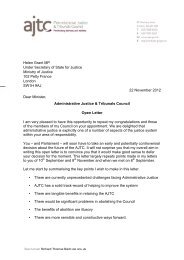Tribunal user groups survey - Administrative Justice & Tribunals ...
Tribunal user groups survey - Administrative Justice & Tribunals ...
Tribunal user groups survey - Administrative Justice & Tribunals ...
You also want an ePaper? Increase the reach of your titles
YUMPU automatically turns print PDFs into web optimized ePapers that Google loves.
<strong>Tribunal</strong> User Groups Survey<br />
February 2008
Introduction<br />
1. Last year the Council on <strong>Tribunal</strong>s (now the <strong>Administrative</strong> <strong>Justice</strong> and<br />
<strong>Tribunal</strong>s Council) undertook a short <strong>survey</strong> focussing on the operation<br />
of tribunal <strong>user</strong> <strong>groups</strong> (sometimes known as ‘stakeholder’ <strong>groups</strong>).<br />
The purpose of the <strong>survey</strong> was to obtain some basic information about<br />
how tribunal <strong>user</strong> <strong>groups</strong> operate and, by seeking views from external<br />
attendees of <strong>user</strong> <strong>groups</strong>, to establish whether it was possible to<br />
identify examples of best practice in their operation.<br />
2. Members of the AJTC regularly attend the meetings of tribunal <strong>user</strong><br />
<strong>groups</strong> as part of fulfilling the AJTC’s statutory role of overseeing the<br />
operation of tribunals. Members have over time noted a wide variety of<br />
practices in how different <strong>user</strong> <strong>groups</strong> operate. The increase in the<br />
number of <strong>user</strong> <strong>groups</strong> in recent years has been a phenomenon that<br />
the AJTC has been pleased to observe, and indeed has actively<br />
encouraged.<br />
3. The AJTC is grateful to contacts within the <strong>Tribunal</strong>s Service and the<br />
other tribunals systems it oversees for their assistance in compiling the<br />
mailing lists for the purpose of distributing the <strong>survey</strong> questionnaire.<br />
However, it soon became clear that some mailing lists were not as<br />
comprehensive in their coverage or as up to date as others. Because<br />
of the difficulties in obtaining complete and up-to-date lists of contact<br />
addresses for <strong>user</strong> group members the general findings of the <strong>survey</strong><br />
can only be seen as anecdotal. However, they nevertheless provide a<br />
useful overall impression of the <strong>user</strong> group landscape. Moreover, in<br />
order to obtain a truly <strong>user</strong>-focussed perspective, <strong>survey</strong><br />
questionnaires were only issued to the ‘<strong>user</strong>’ representatives of tribunal<br />
<strong>user</strong> <strong>groups</strong>.<br />
4. In examining lists of attendees of <strong>user</strong> <strong>groups</strong> the AJTC noted that for<br />
some tribunals the membership of <strong>user</strong> <strong>groups</strong> is heavily dominated by<br />
government and tribunal officials. The majority of ‘stakeholders’ within<br />
<strong>user</strong> <strong>groups</strong> comprise representatives from organisations which<br />
support tribunal <strong>user</strong>s rather than actual tribunal <strong>user</strong>s themselves.<br />
Summary<br />
5. The <strong>user</strong> <strong>groups</strong> <strong>survey</strong>ed included those for tribunals within the<br />
<strong>Tribunal</strong>s Service: Asylum and Immigration <strong>Tribunal</strong>, Asylum Support<br />
<strong>Tribunal</strong>, Care Standards <strong>Tribunal</strong>, Criminal Injuries Compensation<br />
Appeals Panel, Employment <strong>Tribunal</strong>s, Financial Services and Markets<br />
<strong>Tribunal</strong>, Gender Recognition Panel, Mental Health Review <strong>Tribunal</strong>,<br />
Special Educational Needs and Disability <strong>Tribunal</strong>, VAT and Duties<br />
<strong>Tribunal</strong>, Social Security and Child Support Appeal <strong>Tribunal</strong>s. Those<br />
outside the <strong>Tribunal</strong>s Service included Parking Adjudicators, Planning<br />
Inspectorate, Residential Property <strong>Tribunal</strong> Service and Valuation<br />
<strong>Tribunal</strong>s.<br />
6. There was a relatively low overall response rate (17%), with 199<br />
responses from 1,156 <strong>survey</strong> questionnaires issued. However, a good<br />
response rate was recorded for <strong>user</strong> <strong>groups</strong> for specific jurisdictions,<br />
1
e.g. Employment <strong>Tribunal</strong>s (40%), SENDIST (43%) and Parking<br />
Adjudicators (57%). Nevertheless, the following observations can be<br />
made from the findings.<br />
Overall Findings<br />
• Overall, the <strong>survey</strong>’s findings were generally favourable as<br />
regards the management of <strong>user</strong> <strong>groups</strong>, with most respondents<br />
considering them to be useful, well run and informative;<br />
• Most <strong>user</strong> <strong>groups</strong> appear to have 1-2 representatives from each<br />
<strong>user</strong> organisation who nearly always attend all the meetings,<br />
wherever possible. Most respondents believed that the<br />
membership of the <strong>user</strong> group was sufficiently representative of<br />
the <strong>user</strong>s of the tribunal;<br />
• The majority of respondents were unaware of the existence of<br />
terms of reference for their particular <strong>user</strong> group, even where<br />
such terms of reference were reported to be available;<br />
• Most <strong>user</strong> <strong>groups</strong> meet on average twice a year and<br />
respondents were happy with this frequency of meetings;<br />
• The suitability of meeting venues is thought to be generally good<br />
and arrangements for meetings (in terms of refreshments etc.)<br />
were thought to be adequate. Where they are known in<br />
advance, arrangements for people with disabilities were<br />
accommodated;<br />
• In terms of the chairing of <strong>user</strong> group meetings, the majority of<br />
respondents felt their meetings were chaired effectively and that<br />
the tone of the meetings was about right;<br />
• Minutes and/or a report of meetings appear to be circulated after<br />
meetings as a matter of routine, although some respondents<br />
commented that minutes could be produced in a more timely<br />
fashion.<br />
7. Overall, <strong>user</strong> <strong>groups</strong> appear to be welcomed by stakeholders as a<br />
useful discussion forum, providing the opportunity to discuss current<br />
issues of interest to <strong>user</strong> representatives and to receive updates on<br />
current developments. Meetings appear universally to be well chaired,<br />
with good information provision and opportunity to interact. There is<br />
perhaps not yet a complete sense of ‘ownership’ on the part of external<br />
stakeholders, with some, for example, doubting whether their<br />
contributions have a direct impact on policy or practice, either at a local<br />
or national level. The focus of <strong>user</strong> <strong>groups</strong> also appears to vary from<br />
jurisdiction to jurisdiction, with some functioning principally as a means<br />
of imparting information about policy updates, whilst others encourage<br />
active discussion of pertinent local issues affecting tribunals in their<br />
particular region.<br />
8. The responses from three regional <strong>user</strong> <strong>groups</strong>, which elicited a higher<br />
response rate, were analysed more closely. These included a regional<br />
2
Employment <strong>Tribunal</strong> <strong>user</strong> group, a SENDIST group and a Social<br />
Security & Child Support Appeal <strong>Tribunal</strong>s group. Examination of the<br />
overall findings from the <strong>survey</strong> results for these <strong>groups</strong> has identified<br />
some general best practice suggestions for the operation of <strong>user</strong><br />
<strong>groups</strong>. These are not intended to be universally applicable, but rather<br />
aim to provide some best practice guidelines, which could be adopted,<br />
for example, when setting up a new <strong>user</strong> group.<br />
Best practice suggestions<br />
• User <strong>groups</strong> should have clear terms of reference for the<br />
group’s operation in order to enhance its effectiveness;<br />
• The arrangements for <strong>user</strong> group meetings should be accessible<br />
to all <strong>user</strong> group representatives and take account of the needs<br />
of those with disabilities;<br />
• The membership of <strong>user</strong> <strong>groups</strong> should be reviewed regularly<br />
(at least annually) to ensure that it includes representatives from<br />
the tribunal’s key stakeholders;<br />
• The frequency of meetings and future meeting dates should be<br />
agreed well in advance;<br />
• All <strong>user</strong> group members should be encouraged actively to<br />
contribute to the agenda for meetings;<br />
• User group members should be enabled and encouraged to<br />
provide regular feedback about the operation of the group;<br />
• Comprehensive minutes of meetings should be kept, recording<br />
agreed action points, which should be reported back at<br />
subsequent meetings;<br />
• Chairs of <strong>user</strong> group meetings should encourage active<br />
participation from group members.<br />
9. The key messages from <strong>user</strong> <strong>groups</strong> were remarkably consistent in<br />
terms of the reported good standard of administration and organisation<br />
and the suggestions above include examples of good practice that are<br />
already in operation.<br />
3
<strong>Tribunal</strong>s User Groups Survey Report<br />
Overview of Responses to Survey<br />
Questions<br />
1. Overview of the User Group<br />
Q1.1 Of which tribunal <strong>user</strong> group are you a member?<br />
See breakdown of responses at Annex A.<br />
Q1.2 How did you first learn about the <strong>user</strong> group and how did you<br />
become a member?<br />
The responses were broken down into four areas:<br />
- taking over the role from a colleague<br />
- invited to join by the tribunal, or governing body, by letter or<br />
nomination/publicity/flyer<br />
- by word of mouth<br />
- don’t know/other<br />
The clear majority of respondents first learned about the <strong>user</strong> group by direct<br />
invitation from the tribunal, through letter, via nominations, or other invitation<br />
through another body.<br />
The next largest response group said that they had taken over the role from a<br />
colleague when they took over their job.<br />
Q1.3 How many representatives from your organisation typically attend<br />
<strong>user</strong> group meetings?<br />
The clear majority answered 1 or 2<br />
Q1.4 Do the same people attend every meeting?<br />
The majority of respondents replied “yes” or “usually where possible”, with a<br />
significant majority saying that if they were unable to attend someone would<br />
attend in their place.<br />
Q1.5 In your view, is the membership of the <strong>user</strong> group sufficiently<br />
representative of the tribunal’s <strong>user</strong>s?<br />
This question elicited a range of responses. The majority answered “yes”. In<br />
some instances responses indicated attendance leaning more towards local<br />
authority rather than <strong>user</strong> representatives [SENDIST].<br />
4
Q1.6 Are you aware whether the group has any terms of reference, and<br />
if so, are they sufficiently well framed to cover the relevant<br />
issues?<br />
A clear majority of respondents were unaware whether the group had any<br />
terms of reference.<br />
Q1.7 How often does the group meet and what percentage (%) of<br />
meetings are you able to attend?<br />
Responses varied from tribunal to tribunal, but in general indicated that the<br />
majority of <strong>user</strong>s <strong>groups</strong> meet twice a year.<br />
2. User Group arrangements<br />
Q2.1 In your view does the group meet frequently enough?<br />
The overwhelming majority said “yes”.<br />
Q2.2 Are there too many/ too few/ about the right number of people in<br />
the group?<br />
The overwhelming majority said that the <strong>groups</strong> were made up of about the<br />
right number of people.<br />
Q2.3 Is the location of the group’s meetings reasonably convenient for<br />
you to travel to?<br />
The overwhelming majority said that the <strong>groups</strong> met in a convenient location.<br />
Q2.4 Are the administrative arrangements for the meeting adequate –<br />
e.g. adequate notice, appropriate venue, sufficient seating,<br />
refreshments etc?<br />
Most respondents said that the meeting arrangements were adequate,<br />
although a small number said they would welcome better refreshment<br />
facilities.<br />
Q2.5 Is adequate provision made for people with special needs to<br />
attend and contribute to group meetings?<br />
The majority replied “yes”, but a significant number also put “don’t know” or<br />
didn’t express an opinion.<br />
3. User Group meetings<br />
Q3.1 Does the agenda for meetings generally address the issues that<br />
matter to you?<br />
Responses were very positive, with the majority of respondents saying “yes”.<br />
Q3.2 Are you able to suggest items for the agenda for meetings?<br />
The majority of respondents said “yes”.<br />
5
Q3.3 Are <strong>user</strong> group meetings chaired effectively?<br />
The majority said “yes”, “very well”, or “very effectively”.<br />
Q3.4 Would you prefer a different arrangement for chairing <strong>user</strong> group<br />
meetings, e.g. would there be any benefit from rotating the<br />
chairing of meetings between the tribunal and <strong>user</strong><br />
representatives?<br />
Generally, respondents replied “no”, stating that the existing arrangements<br />
worked well, for example, “I find the present arrangement works well. The<br />
chair has the best combination of experience and involvement to chair the<br />
meeting. I do not believe there is neither a need nor a desire for the<br />
representatives to chair the meeting.” [Employment <strong>Tribunal</strong>, Liverpool<br />
Group]<br />
Q3.5 What is the general tone of meetings, e.g. are they friendly,<br />
welcoming, interactive, participatory?<br />
Generally the feeling was that the meetings worked well. The question was<br />
perhaps too leading as most respondents used all or a combination of the<br />
descriptions in the question to describe meetings.<br />
Q3.6 How do you feed back information about the <strong>user</strong> group’s<br />
discussions to your colleagues?<br />
Most respondents said that minutes and or reports of meetings were<br />
circulated through a variety of methods including email/ memo/ or by<br />
forwarding notes. Alternatively, feedback was given verbally in staff or<br />
committee meetings, or as part of a staff newsletter or forum.<br />
Q3.7 Does the tribunal welcome feedback about its work from<br />
attendees at the meetings?<br />
The overwhelming majority said “yes” without giving much detail.<br />
Q3.8 Are minutes and papers provided for the meetings, and if so, are<br />
they provided in a timely fashion?<br />
The majority said “yes”, but there were quite a number of comments<br />
suggesting that minutes could be produced in a more timely fashion.<br />
4. Further Comments or Suggestions<br />
Q4.1 Do you have any further comments or suggestions that might<br />
improve the effectiveness of the <strong>user</strong> group?<br />
25% of respondents did not reply to this question. However, of those who did<br />
comments included:<br />
- I got a lot of information from the meetings which I might not otherwise<br />
have found out, so it was very useful to me [NPAS].<br />
- The meetings are too dominated by a small number of lawyers and<br />
officials who focus on issues of concern to them. There are no service<br />
6
<strong>user</strong> representatives and not enough professional <strong>groups</strong> represented<br />
e.g. nurses, doctors, social workers [MHRT].<br />
- It could be better publicised so more people are aware of the group, its<br />
work and how <strong>user</strong>s generally can contribute to its effectiveness [ET<br />
Manchester Group].<br />
- Most <strong>user</strong> <strong>groups</strong> are simply to provide clarification or updates. It would<br />
have been helpful to have more scope for open debate on issues<br />
[PATAS].<br />
- Widen the parental participation. Actively invite parents who have<br />
attended a SENT hearing without representation to attend [SENT<br />
Wales].<br />
- Regular monitoring by TS or the <strong>user</strong> group of the effectiveness of the<br />
action points take. The monitoring could last for 12 months after the<br />
agreed action point has been implemented [SSCSA National<br />
Customer Liaison Forum].<br />
Q4.2 To what extent do you think the <strong>user</strong> group helps to shape the<br />
services provided by the tribunal to <strong>user</strong>s?<br />
Examples of comments made include:<br />
- Whilst an important part of the group’s function is the provision of<br />
information, I believe it is useful in providing comments that the ETS<br />
has taken into account. It remains to be seen how responsive the new<br />
TS organisation will be to the group’s views [ET National User<br />
Group].<br />
- It is very useful – we only visit tribunals as reps. These meetings are an<br />
excellent opportunity to see how it works and the issues that concern<br />
the members [SSCSA regional group].<br />
- I still need to know TS better on a personal level as I rely on staff for<br />
help – details of names/ telephone extensions and area covered,<br />
regularly updated is a minimum for efficient administration. I need to<br />
have access to more senior staff when necessary.<br />
- This will depend on the topics being discussed and whether the<br />
purpose of the meeting it to clarify issues/processes by the tribunal and<br />
also whether the topic is also bound by a rigid legislative framework.<br />
Furthermore, whether the leader of the tribunal is open to change or<br />
merely dictating to the Authorities [PTAS].<br />
- As a part-time volunteer I advise representatives with not much<br />
support; it is easy to feel isolated and the <strong>user</strong> group helps to sort out<br />
some issues. For some reason, I constantly wish I had more feedback<br />
after tribunals. Would the same result have happened had I not been<br />
there? Could I have done better? I have no idea how this can be<br />
addressed in practice but I refer it up [SSCSA regional group].<br />
7
Findings from regional <strong>user</strong> <strong>groups</strong><br />
<strong>Administrative</strong> Practices<br />
Employment <strong>Tribunal</strong> (Bristol)<br />
1. Within this particular group, on average, 1 or 2 members from each of the<br />
stakeholder <strong>groups</strong> regularly attend <strong>user</strong> group meetings. Some took over<br />
membership from their predecessors or joined through word of mouth, or<br />
were invited to become members by the tribunal. Generally, most felt the<br />
<strong>groups</strong> were sufficiently representative of the tribunal’s <strong>user</strong>s, with two<br />
respondents commenting that the <strong>groups</strong> comprised a good mix of<br />
employers, employer representatives and <strong>user</strong> representatives. None of<br />
the respondents was aware of the group having any formal terms of<br />
reference.<br />
2. The ET National User Group appears to have formal terms of reference,<br />
but according to the administrative contact there are no terms of reference<br />
for the regional <strong>groups</strong>. Moreover, mailing lists for regional <strong>groups</strong> had to<br />
be obtained from a regional contact as they are not held centrally.<br />
3. All those who responded were satisfied with the frequency of meetings<br />
(which was roughly twice a year) and felt that there was the right number<br />
of people in the group. The locations for meetings were acceptable and<br />
the administrative arrangements (general facilities, refreshments etc) were<br />
thought to be adequate. Information about special provision for those with<br />
special needs, however, was generally not known.<br />
SENDIST regional <strong>groups</strong><br />
1. For the purpose of analysing responses the data from all four SENDIST<br />
regional <strong>groups</strong> (North, Midlands, London/East and South/South West)<br />
has been grouped together. There is not enough individual data to analyse<br />
each group. The lists of attendees was provided by a central contact and<br />
accompanied a comprehensive explanation of the terms of membership<br />
and intended composition of the <strong>groups</strong>. However, some respondents<br />
were unaware whether the <strong>groups</strong> had any terms of reference.<br />
2. Membership of SENDIST regional <strong>groups</strong> appears to be through invitation<br />
by the central administration to interested organisations such as the<br />
Association of Teachers and Lecturers, the British Dyslexia Association,<br />
IPSEA and the West Midlands Advisory Association on Special Education.<br />
3. Membership of the <strong>user</strong> <strong>groups</strong> is thought to be broadly representative of<br />
the tribunal’s <strong>user</strong>s, but membership data is split over four regions so it is<br />
difficult to draw any firm conclusions.<br />
4. Members were generally happy with the frequency of meetings (twice<br />
yearly) and the number of people in the <strong>groups</strong>. The locations for the<br />
meetings were thought to be good, with some efforts to alternate venues.<br />
The provision of refreshments at meetings was generally adequate,<br />
although around half the respondents were unclear as to whether special<br />
arrangements were available to meet special needs.<br />
8
SSCSA (Bristol Group)<br />
1. User group meetings are led by the judiciary and administrators in the<br />
regions. The lists of <strong>user</strong> group attendees were incomplete, comprising a<br />
mixture of e-mail and mailing addresses. The National User Group<br />
appears to have formal terms of reference but not the regional <strong>groups</strong>.<br />
2. Most members of this group were co-opted as members through their<br />
predecessors or heard about it through their current role. Generally,<br />
stakeholders felt that the membership of the group was representative of<br />
the tribunal’s <strong>user</strong>s, but most were not aware of the existence of any terms<br />
of reference.<br />
3. Respondents were generally happy with the frequency of the meetings (2<br />
to 3 times a year) and felt that there were about the right number of people<br />
at the meetings. The location of the meetings was acceptable as well as<br />
the facilities provided. There was a greater awareness of the need for<br />
special provision for people with special needs.<br />
Good practice suggestions:<br />
• Provide clear terms of reference for the group to enhance transparency of<br />
the group’s aims and objectives;<br />
• Highlight provision/accessibility issues for those with special needs;<br />
• Regularly review the membership of the group (and associated mailing<br />
lists) to ensure that it covers the tribunal’s key <strong>user</strong> <strong>groups</strong>;<br />
• Agree as a group the usual frequency of meetings and fix meeting dates<br />
well in advance.<br />
Satisfaction levels with the organisation/management of <strong>user</strong> <strong>groups</strong><br />
The commentary below relates to the answers provided in section 3 of the<br />
<strong>user</strong> <strong>survey</strong> i.e. satisfaction levels regarding how the <strong>user</strong> <strong>groups</strong> are run –<br />
such as the ability to influence the agenda, the chairing of meetings etc.<br />
Employment <strong>Tribunal</strong> (Bristol)<br />
1. The responses indicated positive satisfaction levels overall, pertaining to<br />
the agenda in general and the ability of attendees to influence it. One<br />
respondent commented ‘we are offered the chance to add topics to the<br />
agenda when we reply to the invitation to attend’. The chairing of meetings<br />
was also thought to be effective.<br />
2. All responded positively about the general tone of meetings, describing<br />
them as friendly, welcoming, interactive, participatory etc. One respondent<br />
commented ‘I find them a very good forum and people are willing to<br />
participate’. Another commented ‘friendly - the chair encourages<br />
interaction and invites contributions to the forum’.<br />
3. Nearly all respondents indicated that they feed back information from the<br />
meetings to their own teams, either by memo, circulating minutes, email or<br />
orally in staff meetings. Nearly all commented that the tribunal welcomed<br />
9
feedback about its work from attendees. Nearly all respondents received<br />
minutes and papers in a timely fashion before the meeting.<br />
SENDIST regional <strong>groups</strong><br />
1. All respondents generally agreed that the agenda for meetings addressed<br />
the important issues, although some comments reflected the following<br />
point: ‘the agenda is usually set by SENDIST and so reflects issues more<br />
related to them’. One respondent questioned whether there was any<br />
‘effective forward movement of points raised’.<br />
2. All agreed that it was possible to suggest items for the agenda and<br />
practically all were satisfied with the chairing of meetings. Regarding the<br />
suggestion of rotating the chairing of the meeting, there were a few<br />
hesitations, although most respondents preferred the current<br />
arrangements: one respondent commented ‘given the membership of the<br />
North West group, I am not sure rotation would be a good idea. I feel that<br />
certain representatives have their own agenda and this might influence the<br />
running of the meeting’.<br />
3. When asked about the general tone of the meeting, most respondents<br />
agreed it was a positive atmosphere, although there were some concerns<br />
raised, ‘…I am concerned that representatives of certain voluntary <strong>groups</strong><br />
use the meetings as an opportunity to indulge in 'local authority bashing' at<br />
every opportunity. This is not discouraged by the Chair’.<br />
4. Another commented ‘The meetings are…usually friendly and participatory,<br />
although [it] can take new attendees a while to realise…………….they can<br />
become confrontational and try to use meeting as a forum for arguing a<br />
current case with an opponent, or trying to get legal advice from SENDIST<br />
panel members on a case’.<br />
5. There was also feedback from meetings to colleagues via staff meetings,<br />
emails or circulation of minutes.<br />
SSCSA (Bristol Group)<br />
1. All respondents agreed that the agenda for the meetings addressed issues<br />
of relevance and that there was opportunity to suggest further items or<br />
action points. Respondents agreed that meetings were chaired effectively,<br />
although a few mentioned that occasionally the agenda ran over time. No<br />
respondents suggested a different arrangement for chairing and felt that<br />
the tone of meetings was positive.<br />
2. As with the other <strong>groups</strong>, feedback to colleagues about the meeting was<br />
either via internal team meetings, email or oral discussion.<br />
3. Generally, participants felt able to provide feedback about the work of the<br />
<strong>user</strong> group in the meetings and were content with the timely fashion of any<br />
minutes and papers dispersed.<br />
10
Good practice suggestions:<br />
• User organisations should be encouraged to contribute to the agenda for<br />
meetings<br />
• Attendees should be encouraged to provide regular feedback about the<br />
effectiveness of the <strong>user</strong> group;<br />
• Minutes of meetings should be comprehensive and record actions points,<br />
which should be reported on at subsequent meetings;<br />
• Chairs should have participative chairing skills;<br />
• Regard should be had to the special needs of attendees.<br />
Comments/suggestions from respondents on (a) effectiveness of group<br />
and (b) how the group helps to shape the services provided by the<br />
tribunal to its <strong>user</strong>s<br />
All comments are practically verbatim as they appear in the <strong>survey</strong> responses.<br />
(a) Effectiveness of the <strong>user</strong> group<br />
Employment <strong>Tribunal</strong> (Bristol)<br />
‘Greater use of email, for example a <strong>user</strong> website or blog’<br />
‘Prompt start time’<br />
‘Focus is on ET's operational side and also how the solicitors/barristers<br />
operate to assist the ET understand the pressure experienced’.<br />
SENDIST<br />
‘Review membership. Representatives should be nominated, elected and<br />
represent a body/interested group - there should be a balance.’<br />
‘Even if it is not feasible to extend the membership of LA reps, the tribunal<br />
could email all LAs in a particular area prior to meetings and ask if they have<br />
any items they would wish discussed’.<br />
‘It would be helpful if recent legal rulings resulting from SENDIST appeals<br />
were made known to the group in order that we are all up to date. Often,<br />
reference is made to them in an incidental manner’.<br />
‘Would be good to invite parents, advocacy <strong>groups</strong> from across the whole of<br />
England & Wales. Easier and more transparent way for <strong>user</strong>s to become part<br />
of the group’.<br />
‘Even if the minutes are not available, the time/date of the next meeting as<br />
soon as possible would be helpful’.<br />
SSCSA (Bristol Group)<br />
‘Opportunity to discuss/input into changes in practices - e.g. appeal<br />
procedures’.<br />
‘Minutes issued within a few weeks of meeting’.<br />
11
‘Meetings can often reflect the nature of the chairman (judiciary) who attend -<br />
some are very open; others hide behind their status’.<br />
(b) How the group helps to shape the services provided by the tribunal<br />
to its <strong>user</strong>s<br />
Employment <strong>Tribunal</strong> (Bristol)<br />
‘I think our views are taken into account at a local level’.<br />
(The meeting is) ‘run efficiently, timely. Very important that they continue’.<br />
‘When potentially contentious issues come up e.g. new DDP's, there was<br />
much two-way discussion, but feeling that chair had decided how they would<br />
operate’.<br />
‘Helpful as they give an indication of local and national practice in various<br />
areas’.<br />
‘It helps significantly - a forum for the provision of honest feedback to the<br />
tribunal members on how they deal with cases and the legislation from a<br />
practical viewpoint, and encourages feedback from the <strong>user</strong>s as to how the<br />
tribunal itself can be improved’.<br />
‘I expect <strong>user</strong>s to be the most important group in terms of the shaping of the<br />
tribunals service’.<br />
‘Unable to say whether the tribunal has changed its practices’.<br />
SENDIST<br />
‘A questionnaire to all <strong>user</strong>s from time to time asking about how the tribunal is<br />
run etc. would be an effective way of gaining <strong>user</strong>s' views’.<br />
‘Part of a broad consultation, direct feedback, open discussion. How much<br />
can any of us really influence govt. decisions? - e.g. Ministry of <strong>Justice</strong>’.<br />
‘I don't think it significantly affects the actual services but I do think it affects<br />
the way the services are delivered, to the benefit of <strong>user</strong>s.’<br />
‘It would be useful to see what suggestions have been made and the<br />
outcome/how/if changes were made to the service as a result of the group’s<br />
influence’.<br />
‘I feel it does help shape tribunal services as concerns are listened to and<br />
action taken’.<br />
‘Some issues which concern <strong>user</strong>s result from the statutory framework under<br />
which SENDIST has to operate. Where there are no legal constraints<br />
SENDIST is amenable to adapting its processes and procedures when<br />
persuaded of the benefits to <strong>user</strong>s’.<br />
‘I think the Group takes on board feedback from all representative parties and<br />
regularly re-examines and evaluates current working practices’.<br />
‘I feel the more 'minor' issues are responded to, but the crunch issue of<br />
inconsistency of chairing hearings is brushed aside’.<br />
12
SSCSA (Bristol Group)<br />
‘It is very useful - we only visit tribunals as reps. These meetings are an<br />
excellent opportunity to see how it works and issues that concern the<br />
members’.<br />
‘Pretty good - if we understand and relay appellants’ concerns accurately -<br />
and I doubt that we do sometimes’.<br />
‘I think it is a very useful forum and should continue’.<br />
‘I feel confident that our views are considered and action taken where<br />
relevant’.<br />
‘In general they are positive in shaping the nature of the <strong>Tribunal</strong>s Service’s<br />
approach. But often national policy can reduce the impact’.<br />
‘Difficult to say. I have the sneaking feeling that as with many organisations<br />
there is a pre-ordained agenda and the influence of meetings is helpful only<br />
within that agenda’.<br />
13
Annex A<br />
Breakdown of <strong>survey</strong> responses<br />
User Group Forms Issued Forms Returned % Returned<br />
Asylum and Immigration <strong>Tribunal</strong> 18 1 6%<br />
Asylum Support <strong>Tribunal</strong> 22 4 18%<br />
Care Standards <strong>Tribunal</strong> 14 1 7%<br />
CICAP 21 5 24%<br />
Employment <strong>Tribunal</strong> – National 13 2 15%<br />
Employment <strong>Tribunal</strong> –<br />
Southampton/Brighton/Reading N/K 16 ---<br />
Employment <strong>Tribunal</strong> – Newcastle N/K 6 ---<br />
Employment <strong>Tribunal</strong> – Leeds/Sheffield<br />
N/K 2 ---<br />
Employment <strong>Tribunal</strong> –<br />
Nottingham/Leicester N/K 1 ---<br />
Employment <strong>Tribunal</strong> – Regional Group<br />
Manchester 25 10 40%<br />
Employment <strong>Tribunal</strong> – Regional Group<br />
Liverpool 13 2 15%<br />
Employment <strong>Tribunal</strong> – Regional Group<br />
Cardiff 25 4 16%<br />
Employment <strong>Tribunal</strong> – Regional Group<br />
Bristol 54 12 22%<br />
Employment <strong>Tribunal</strong> – Regional Group<br />
Exeter 47 8 17%<br />
Financial Services and Markets <strong>Tribunal</strong><br />
8 1 13%<br />
Gender Recognition Panel 4 2 50%<br />
Mental Health Review Panel 14 3 21%<br />
Parking Adjudicators – NPAS 7 4 57%<br />
Parking Adjudicators – PATAS 38 3 8%<br />
Planning Inspectorate (including Access<br />
to Countryside Inquiries, Enforcement<br />
Notice Appeals, Local & Unitary<br />
70 8 11%<br />
Development Plans, Planning Appeals<br />
Residential Property <strong>Tribunal</strong> Service 21 4 19%<br />
Road Users Charging Adjudicator 27 --- 0%<br />
National Customer Representative<br />
34 9 26%<br />
Liaison Forum (SSCSA)<br />
Special Commissioners of Income Tax 5 --- 0%<br />
SENDIST – Midlands/North/South<br />
West/London & South 49 20 41%<br />
SENT Wales – North Wales/South<br />
Wales and West 74 10 14%<br />
Valuation <strong>Tribunal</strong>s Service for Wales 4 --- 0%<br />
Valuation <strong>Tribunal</strong>s Service 5 --- 0%<br />
VAT and Duties <strong>Tribunal</strong> 3 --- 0%<br />
VAT and Duties <strong>Tribunal</strong>/Special<br />
43%<br />
Commissioners 7 3<br />
SSCSA – Truro/South East/Bristol &<br />
Cheltenham/Taunton/Swansea/North<br />
Wales/Exeter & Plymouth/Surrey/Cardiff 522 53 10%<br />
Downloaded from the website<br />
anonymously --- 5 ---<br />
14


